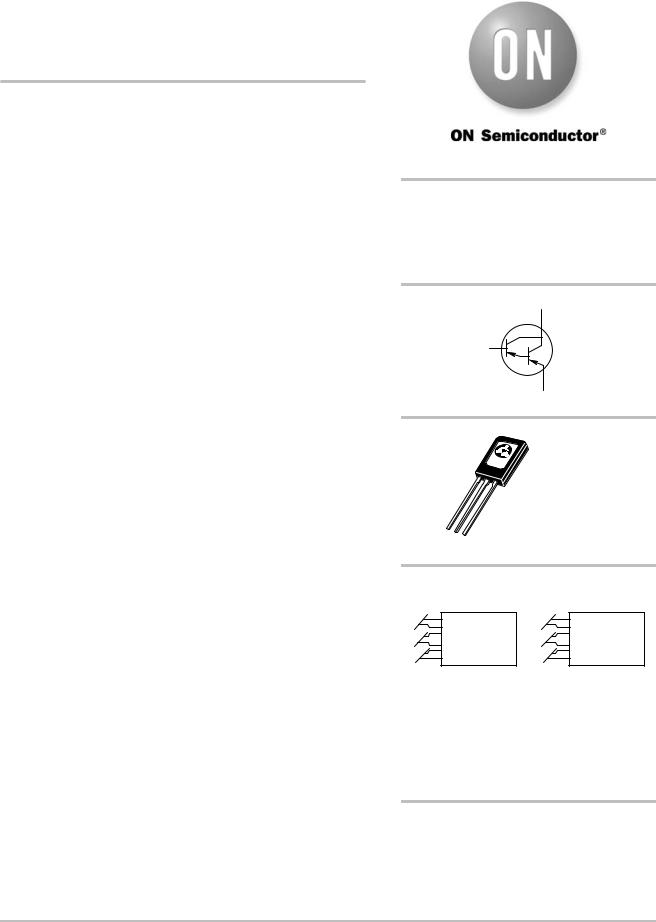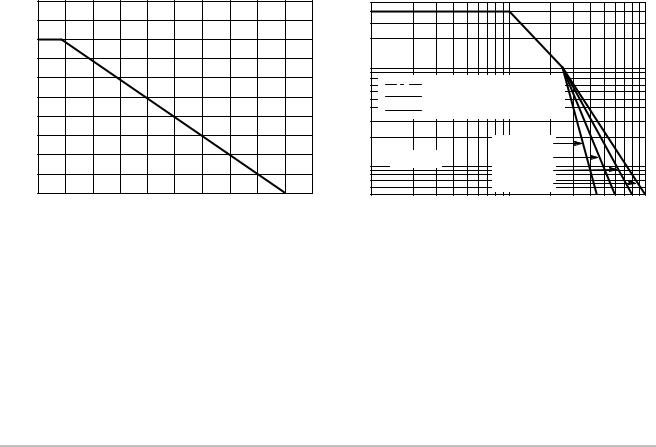ON Semiconductor BD676, BD676A, BD678, BD678A, BD680 Service Manual
...
BD676, BD676A, BD678, BD678A, BD680, BD680A, BD682, BD682T
Plastic Medium-Power
Silicon PNP Darlingtons
This series of plastic, medium−power silicon PNP Darlington transistors can be used as output devices in complementary general−purpose amplifier applications.
Features
• High DC Current Gain −
hFE = 750 (Min) @ IC = 1.5 and 2.0 Adc
•Monolithic Construction
•BD676, 676A, 678, 678A, 680, 680A, 682 are complementary with BD675, 675A, 677, 677A, 679, 679A, 681
•BD678, 678A, 680, 680A are equivalent to MJE 700, 701, 702, 703
•Pb−Free Package are Available*
MAXIMUM RATINGS
Rating |
Symbol |
Value |
Unit |
|
|
|
|
Collector-Emitter Voltage |
VCEO |
|
Vdc |
BD676, BD676A |
|
45 |
|
BD678, BD678A |
|
60 |
|
BD680, BD680A |
|
80 |
|
BD682 |
|
100 |
|
|
|
|
|
Collector-Base Voltage |
VCB |
|
Vdc |
BD676, BD676A |
|
45 |
|
BD678, BD678A |
|
60 |
|
BD680, BD680A |
|
80 |
|
BD682 |
|
100 |
|
|
|
|
|
Emitter-Base Voltage |
VEB |
5.0 |
Vdc |
Collector Current |
IC |
4.0 |
Adc |
Base Current |
IB |
0.1 |
Adc |
Total Device Dissipation |
PD |
|
|
@ TC = 25°C |
|
40 |
W |
Derate above 25°C |
|
0.32 |
W/°C |
|
|
|
|
Operating and Storage Junction |
TJ, Tstg |
−55 to +150 |
°C |
Temperature Range |
|
|
|
|
|
|
|
THERMAL CHARACTERISTICS |
|
|
|
Characteristic |
Symbol |
Max |
Unit |
|
|
|
|
Thermal Resistance, |
RqJC |
3.13 |
°C/W |
Junction−to−Case |
|
|
|
|
|
|
|
Maximum ratings are those values beyond which device damage can occur. Maximum ratings applied to the device are individual stress limit values (not normal operating conditions) and are not valid simultaneously. If these limits are exceeded, device functional operation is not implied, damage may occur and reliability may be affected.
*For additional information on our Pb−Free strategy and soldering details, please download the ON Semiconductor Soldering and Mounting Techniques Reference Manual, SOLDERRM/D.
http://onsemi.com
4.0 AMP DARLINGTON POWER TRANSISTORS PNP SILICON
45, 60, 80, 100 VOLT, 40 WATT
COLLECTOR 2
BASE 3
EMITTER 1
TO−225AA
CASE 77
STYLE 1
3 2 1
MARKING DIAGRAMS
YWW |
YWW |
|
B |
||
BD6xxG |
||
BD6xxG |
||
|
BD6xx |
= Device Code |
|
xx = 76, 76A, 78, 78A, |
|
80, 80A, 82, or 82T |
Y |
= Year |
WW |
= Work Week |
G |
= Pb−Free Package |
ORDERING INFORMATION
See detailed ordering and shipping information in the package dimensions section on page 3 of this data sheet.
♥ Semiconductor Components Industries, LLC, 2008 |
Publication Order Number: |
September, 2008 − Rev. 13 |
BD676/D |

BD676, BD676A, BD678, BD678A, BD680, BD680A, BD682, BD682T
ELECTRICAL CHARACTERISTICS (TC = 25_C unless otherwise noted)
Characteristic |
|
Symbol |
Min |
Max |
Unit |
|
||
|
|
|
|
|
|
|
|
|
OFF CHARACTERISTICS |
|
|
|
|
|
|
|
|
|
|
|
|
|
|
|
|
|
Collector−Emitter Breakdown Voltage (Note 1) |
BD676, 676A |
BVCEO |
45 |
|
− |
|
Vdc |
|
(IC = 50 mAdc, IB = 0) |
BD678, 678A |
|
60 |
|
− |
|
|
|
|
BD680, 680A |
|
80 |
|
− |
|
|
|
|
BD682 |
|
100 |
|
− |
|
|
|
|
|
|
|
|
|
|
|
|
Collector Cutoff Current (VCE = Half Rated VCEO, IB = 0) |
|
ICEO |
− |
|
500 |
|
mAdc |
|
Collector Cutoff Current |
|
ICBO |
|
|
|
|
mAdc |
|
(VCB = Rated BVCEO, IE = 0) |
|
|
− |
|
0.2 |
|
|
|
(VCB = Rated BVCEO. IE = 0, TC = 100°C) |
|
|
− |
|
2.0 |
|
|
|
Emitter Cutoff Current (VBE = 5.0 Vdc, IC = 0) |
|
IEBO |
− |
2.0 |
|
mAdc |
|
|
ON CHARACTERISTICS |
|
|
|
|
|
|
|
|
|
|
|
|
|
|
|
|
|
DC Current Gain (Note 1) |
|
hFE |
|
|
|
|
|
|
(IC = 1.5 Adc, VCE = 3.0 Vdc) |
BD676, 678, 680, 682 |
|
750 |
|
− |
|
− |
|
(IC = 2.0 Adc, VCE = 3.0 Vdc) |
BD676A, 678A, 680A |
|
750 |
|
− |
|
− |
|
Collector−Emitter Saturation Voltage (Note 1) |
|
|
|
|
|
|
|
|
(IC = 1.5 Adc, IB = 30 mAdc) |
BD678, 680, 682 |
VCE(sat) |
− |
2.5 |
|
Vdc |
|
|
(IC = 2.0 Adc, IB = 40 mAdc) |
BD676A, 678A, 680A |
|
− |
2.8 |
|
|
|
|
Base−Emitter On Voltage (Note 1) |
|
VBE(on) |
|
|
|
|
Vdc |
|
(IC = 1.5 Adc, VCE = 3.0 Vdc) |
BD678, 680, 682 |
|
− |
|
2.5 |
|
|
|
(IC = 2.0 Adc, VCE = 3.0 Vdc) |
BD676A, 678A, 680A |
|
− |
|
2.5 |
|
|
|
DYNAMIC CHARACTERISTICS |
|
|
|
|
|
|
|
|
|
|
|
|
|
|
|
||
Small−Signal Current Gain (IC = 1.5 Adc, VCE = 3.0 Vdc, f = 1.0 MHz) |
hfe |
1.0 |
|
− |
|
− |
|
|
1. Pulse Test: Pulse Width v 300 ms, Duty Cycle v 2.0%. |
|
|
|
|
|
|
|
|
|
50 |
|
|
|
|
|
|
|
|
|
|
|
5.0 |
|
|
|
|
|
|
|
|
(WATTS)DISSIPATIONPOWER |
45 |
|
|
|
|
|
|
|
|
|
|
(AMP)CURRENTCOLLECTOR |
|
|
|
|
|
|
|
|
|
40 |
|
|
|
|
|
|
|
|
|
|
2.0 |
|
|
|
|
|
|
|
|
||
|
|
|
|
|
|
|
|
|
|
|
|
|
|
|
|
|
|
|
|
||
|
35 |
|
|
|
|
|
|
|
|
|
|
|
1.0 |
|
|
|
|
|
|
|
|
|
30 |
|
|
|
|
|
|
|
|
|
|
|
|
|
|
|
|
|
|
|
|
|
|
|
|
|
|
|
|
|
|
|
|
|
|
|
BONDING WIRE LIMIT |
|
|
|
|||
|
|
|
|
|
|
|
|
|
|
|
|
|
|
|
|
|
|
|
|||
|
25 |
|
|
|
|
|
|
|
|
|
|
|
0.5 |
|
|
THERMAL LIMIT at TC = 25°C |
|
|
|||
|
20 |
|
|
|
|
|
|
|
|
|
|
|
|
|
|
SECONDARY BREAKDOWN LIMIT |
|
|
|||
|
|
|
|
|
|
|
|
|
|
|
|
|
|
|
|
|
|
|
|
|
|
|
15 |
|
|
|
|
|
|
|
|
|
|
|
0.2 |
|
|
|
|
BD676, 676A |
|
|
|
D |
10 |
|
|
|
|
|
|
|
|
|
|
C |
|
T |
|
= 25°C |
|
|
|
||
|
|
|
|
|
|
|
|
|
|
|
|
|
BD678, 678A |
|
|
||||||
, |
|
|
|
|
|
|
|
|
|
|
|
, |
0.1 |
|
C |
|
|
|
|
|
|
P |
5.0 |
|
|
|
|
|
|
|
|
|
|
I |
|
|
|
BD680, 680A |
|
|
|||
|
|
|
|
|
|
|
|
|
|
|
|
|
|
|
|
|
|
|
|||
|
0 |
|
|
|
|
|
|
|
|
|
|
0.05 |
|
|
|
|
|
BD682 |
|
|
|
|
30 |
45 |
60 |
75 |
90 |
105 |
120 |
135 |
150 |
165 |
|
|
2.0 |
5.0 |
10 |
20 |
50 |
100 |
|||
|
15 |
|
1.0 |
|
|
||||||||||||||||
|
|
|
|
TC, CASE TEMPERATURE (°C) |
|
|
|
|
|
|
|
VCE, COLLECTOR-EMITTER VOLTAGE (VOLTS) |
|
||||||||
Figure 1. Power Temperature Derating |
Figure 2. DC Safe Operating Area |
There are two limitations on the power handling ability of a transistor average junction temperature and secondary breakdown. Safe operating area curves indicate IC − VCE limits of the transistor that must be observed for reliable operation; e.g., the transistor must not be subjected to greater dissipation than the curves indicate.
At high case temperatures, thermal limitations will reduce the power that can be handled to values less than the limitations imposed by secondary breakdown.
http://onsemi.com
2
